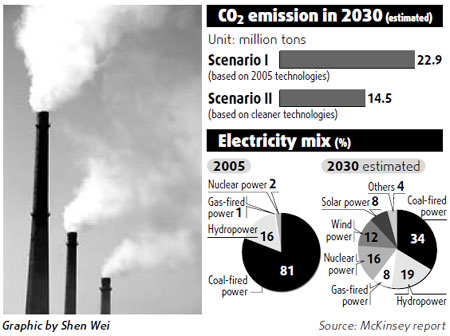
|
BIZCHINA> Industries
 |
|
Environment: Benefit from going green
By Zhao Tingting (China Daily)
Updated: 2009-02-27 10:59 China can reduce its greenhouse gas emissions by 50 percent if it adopts green technologies. This in turn would help the country become a "green economy" by 2030, said a report released yesterday by global consulting firm McKinsey & Co.
 The report also said China can reduce its oil imports by up to 30 to 40 percent and its coal demand by 40 percent and greenhouse gas emissions by 50 percent by 2030. This can be done through investments in technologies that are commercially available and those not widely understood or deployed nowadays. McKinsey estimated that from now on until 2030, additional investments of 1.5-2 trillion yuan would be needed each year to deploy green technologies.
"Because of its relatively early stage of economic development and the rapid pace at which the nation is expected to grow over the next few decades, China can install technologies that are available today into the buildings, cars, and power plants of tomorrow," said Jonathan Woetzel, the Shanghai-based director of McKinsey and the co-author of the report. "As some observers have pointed out recently, China has a unique opportunity to avoid the path that other nations have taken if it now makes the decisions that will ensure a greener future." Martin Joerss, partner in McKinsey's Beijing office and co-author of the report, said "China could be at the forefront of a global green revolution," in two decades. For example, by significantly ramping up investment in clean energy technologies such as nuclear, wind, solar and hydropower, China could cut its reliance on coal as the source of energy for its power plants from 81 percent of total electricity generation today to 34 percent by 2030, the McKinsey report said. The report noted that China has consistently improved the "carbon efficiency" of its economy over the past 15 years. Through a combination of government policies and industry-wide initiatives, China has reduced the amount of carbon dioxide and other greenhouse gases that it produces for every unit of GDP by 4.9 percent each year on average over the past 15 years, compared with just 1.7 percent in the US and 2.7 percent in Germany. "The green road cannot guarantee us definite climate safety purely based on individual country's respective conditions and motivations, unless their seriousness, speed and perseverance are well coordinated under one science-based regime," said Zhang Jianyu, head of the US-based Environmental Defense Fund's China office. However, Huang Shengchu, president of the China Coal Information Institute, said he believed the nation would have to continue relying heavily on coal-fired power. "China's coal-fired power will account for 60 percent of total power output by 2030, although it is declining," he said. (For more biz stories, please visit Industries)
|
|||||
亚洲中文字幕久久精品无码APP| 中文字幕无码一区二区免费| 亚洲午夜AV无码专区在线播放| 中文字幕av日韩精品一区二区| 久久久久亚洲AV无码专区桃色| 国产成人无码AV麻豆| 被夫の上司に犯中文字幕| 亚洲AV人无码综合在线观看| 久久精品中文字幕一区| 无码国内精品久久人妻麻豆按摩| 亚洲AV无码片一区二区三区| 亚洲国产午夜中文字幕精品黄网站| 亚洲AV永久无码天堂影院| 免费A级毛片av无码| 亚洲综合无码AV一区二区| 暖暖免费中文在线日本| 精品人妻中文字幕有码在线| 无码 免费 国产在线观看91| 久久久久久无码Av成人影院| 中文字幕无码第1页| 最好看的最新高清中文视频| 最近中文字幕电影大全免费版 | 久久久无码精品亚洲日韩京东传媒 | 一本色道久久HEZYO无码| 天堂中文在线资源| 国内精品久久久人妻中文字幕 | 中文字幕无码精品亚洲资源网久久 | 视频一区二区中文字幕| 7777久久亚洲中文字幕| 亚洲中文字幕无码一区二区三区| 日韩av片无码一区二区三区不卡 | 中文无码一区二区不卡αv| 免费a级毛片无码免费视频120软件| 精品无码人妻一区二区免费蜜桃| 亚洲AV无码久久精品狠狠爱浪潮| 亚洲情XO亚洲色XO无码| 中文无码伦av中文字幕| 亚洲国产精品无码AAA片| 亚洲日韩精品无码一区二区三区 | 国产Av激情久久无码天堂| 91久久精品无码一区二区毛片|